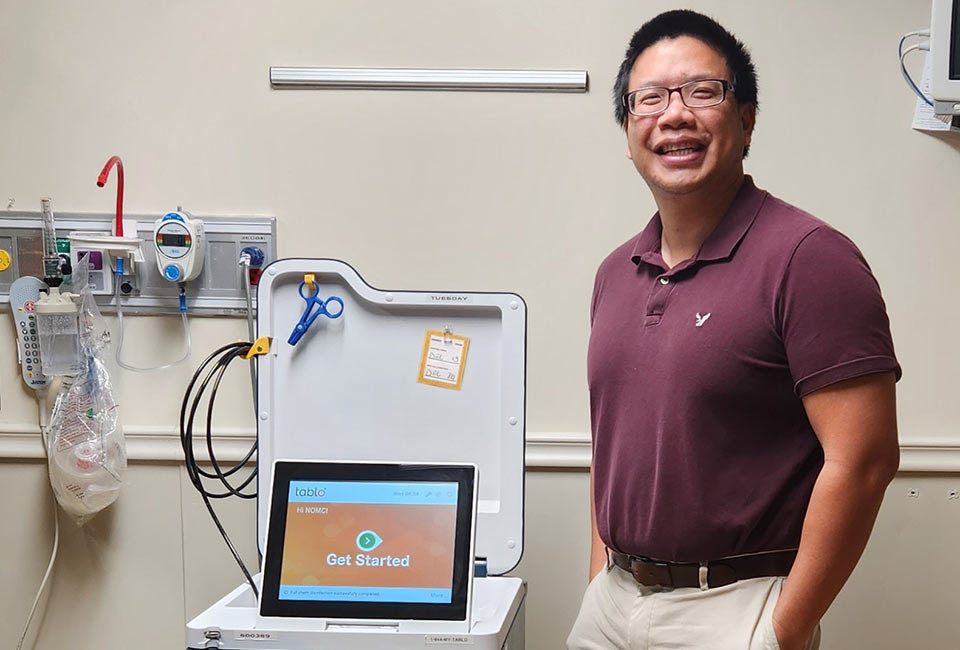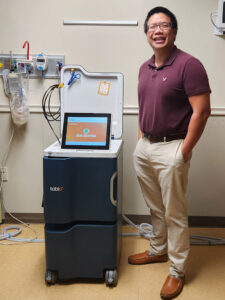How a Nephrologist is Envisioning a Scenario Where Everyone Wins

Summary
U.S. Air Force veteran nephrologist Benjamin Huang, MD, says that hospitals are having to meet the demand to do more with less, and patients shouldn’t be beholden to a dialysis clinic schedule. By empowering staff and patients at home with innovative new technology, a multitude of issues can be solved.

Benjamin Huang, MD is a nephrologist in private practice at Renalus Center for Kidney Care in the western Florida panhandle, with privileges at several local medical centers managing patients from ICU to bedside to clinic. He served in the United States Air Force as an active-duty physician from 2012 until 2021. His last duty station was Eglin Air Force Base where he served as Chief of Nephrology.
While completing his residency at Keesler Air Force Base in Mississippi, Dr. Huang realized that he was drawn to nephrology because of the close relationship he’s able to build with patients. “What matters most to me is making sure that we treat our patients as we would treat our own families. I get to know them, take care of them and talk to their families. Nephrology gives me a chance to do that,” he says. “It’s an exciting time in the field, where technology innovation is making dialysis simpler for everyone and improving the patient experience.”
With experience in all dialysis modalities and on many different machines, from ICU to outpatient, he feels strongly that one machine in particular is helping to solve a multitude of issues at the acute level, and make home hemodialysis a reality for many chronic kidney disease patients. “The pandemic did spotlight that things need to change at long last in dialysis. The Tablo® Hemodialysis System came out in the right place at the right time to show a more efficient way to deliver dialysis,” he says. “I would say Tablo is a scenario where everyone wins.”
Dr. Huang gained experience with Tablo in the acute setting while completing his nephrology fellowship in a joint program between the San Antonio Military Medical Center and the University of Texas Health Science Center San Antonio. “I then heard that Outset Medical was awarded a Veterans Administration [VA] contract, and I was pleasantly blown away by that. Then, when they brought Tablo in at two of my local hospitals here in Florida, based on my previous experience I was glad to be able to offer it to my patients,” he says.
“I would say Tablo is a scenario where everyone wins.”
Personalized Dialysis Care in the Acute Environment
Dr. Huang has several years of experience in prescribing on Tablo in his hospitals, and says the biggest advantage has been the ability for one machine to deliver personalized dialysis care that adapts to patient needs, with minimal machine setup time. “We don’t have to take extra time to pull down the conventional dialysis machine and then wait for it to be strung up. Oftentimes these machines would require many heavy bags of dialysate fluid to be delivered bedside, and they can take up significant space in the hallway,” he says.
He notes that with Tablo, he can transition patients using the same machine for intermittent hemodialysis (IHD), sustained low efficiency dialysis (SLED) or prolonged intermittent renal replacement therapy (PIRRT), with real-time integrated water purification and a much smaller footprint. “You’re cutting down on complexity. You’re cutting down on costs,” continues Dr. Huang. “You can tailor the therapy to the patient at hand, and prescribe treatments up to 24 hours flexibly. You’re streamlining a lot of the processes that come with delivering inpatient renal replacement therapy, whether it be for a stable or critically ill patient. I would argue that time that your patient is not on renal replacement therapy, is time that you’re losing in the fight for that patient.”
Dr. Huang also notes that hospitals are having to meet the demand to do more with less, as the nursing shortage, exacerbated by the pandemic, has been very challenging. He says that it’s a huge plus that any nurse can learn to treat patients on Tablo, even those without dialysis experience. “In our local area, it has been easier to find ICU nurses who have ICU experience versus finding dialysis nurses with dialysis experience. With bringing Tablo in, yes, I’m asking nurses to learn something new. But if you think about it, I’m asking them to learn an easier, more efficient system that can save them time.”
“A lot of us are being asked, especially in the critical care world, to become jacks-of-all-trades and I would say Tablo fits that model very well,” he continues. “You can train staff quickly. From an efficiency standpoint, hands down, there’s no comparison.”

Apples to Apples
Dr. Huang describes how he explains to nurses and other nephrologists the difference between Tablo and traditional dialysis machines. “I give them a hypothetical ICU scenario, in which one patient is using Tablo and another is on an incumbent conventional dialysis machine. Let’s assume that, unfortunately, both patients crash at the same time. Count the minutes on your watch to see how long it would take to change over both patients from IHD to PIRRT. With Tablo, staff with appropriate training can switch the patient quickly to a longer and gentler modality. With the incumbent machines, often staff must take additional time to replace the conventional machine with another machine that offers prolonged therapy. The process of changing out machines can be quite cumbersome in a busy ICU setting, and any lost time becomes loss of a precious resource in treating a patient that is now critical.”
He says that this comparison shows the obvious benefits of Tablo. “With our current paradigm of multiple machines handling different renal replacement modalities, there comes the risk of added complexity, increased costs and inefficient resource management. Tablo offers far more flexibility. I can tailor the treatment to the patient between the hospital ward all the way to intensive care with a single machine. My hospital staff can more efficiently learn hemodialysis without having to juggle multiple interfaces or machines, thus allowing them to spend more time focusing on bedside care of the patient. The ability to tailor dialysis treatments specifically to each patient can be a difficult concept to understand if you’ve been engrained in the old system for a long time.”
“Tablo offers far more flexibility. I can tailor the treatment to the patient between the hospital ward all the way to intensive care with a single machine.”
How Important is Independence to You?
Dr. Huang is also a huge proponent of home dialysis, because he believes it offers patients the ability to live a more fulfilled life and manage their own schedule, rather than being beholden to a rigid clinic schedule. Based on his experience with Tablo, it’s a technology that could fit this ideal.
“My primary question when I see a new patient approaching dialysis or even someone who has been in-center for a few years, is ‘how important is independence to you? Is it important enough to perhaps learn a new skill?’ It does not matter regarding their age, gender, or ethnicity, I present it to them that way,” he says. “I think for the right patient, with the right motivation and willingness to learn a new skill, I think home dialysis is typically a better option. It’s a level of self-empowerment that elevates their personal care.”
“As a nephrologist, I’m so impressed with my home patients who are willing to learn something new and manage their own dialysis,” he continues. “I can see how their demeanor, their energy, their entire personality changes. It shows their capability to maintain independence yet take care of themselves at home. There’s something to be said for patients feeling in control of their health and their dialysis, and living their lives, which is the whole point of doing all of this.”
The views and opinions expressed herein represent the personal opinions of the persons interviewed, and do not represent the views or opinions of other persons, institutions or organization.

